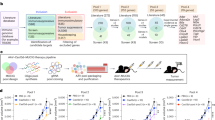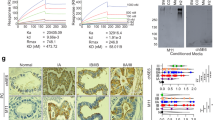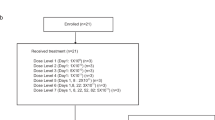Abstract
MUC1 is a membrane bound, polymorphic epithelial mucin expressed at the luminal surface of glandular epithelium. It is highly expressed in an underglycosylated form on carcinomas and metastatic lesions and is, therefore, a potential target for immunotherapy of cancer. The monoclonal antibody HMFG1 binds the linear core protein sequence, PDTR, contained within the immunodominant domain of the tandem repeat of MUC1. The efficacy of murine and humanized HMFG1 (Ab1) used as an anti-idiotypic vaccine was examined in mice transgenic for human MUC1 (MUC1.Tg) challenged with murine epithelial tumour cells transfected with human MUC1. Humoral idiotypic cascade through Ab2 and Ab3 antibodies was observed in MUC1.Tg mice following multiple antibody inoculations in the presence of adjuvant. Impaired tumour growth at day 35 and highest Ab3 levels were found in mice that had received mHMFG1 with RAS adjuvant. However, comparison of Ab3 levels in individual mice with tumour size in all treatment groups did not show a correlation between smaller tumours and increased levels of anti-idiotype antibody. This suggests that the anti-tumour effects of anti-idiotype vaccination are not solely related to the induction of idiotypic antibody cascades and probably involve other mechanisms. © 2000 Cancer Research Campaign
Similar content being viewed by others

Article PDF
Change history
16 November 2011
This paper was modified 12 months after initial publication to switch to Creative Commons licence terms, as noted at publication
References
Agrawal B, Gendler SJ and Longenecker BM (1998a) The biological role of mucins in cellular interactions and immune regulation: prospects for cancer immunotherapy. Molecular Medicine Today, 397–403
Agrawal B, Krantz MJ, Reddish MA and Longenecker BM (1998b) Cancer-associated MUC1 mucin inhibits human T-cell proliferation, which is reversible by IL-2. Nature Medicine 4: 43–49
Apostolopoulos V, Xing PX, Trapani JA and McKenzie IF (1993) Production of anti-breast cancer monoclonal antibodies using a glutathione-S-transferase-MUC1 bacterial fusion protein. Br J Cancer 67: 713–720
Bona CA (1998) Idiotype vaccines: forgotten but not gone. Nature Medicine 4: 668–669
Boon T and Old LJ (1997) Tumor antigens. Current Opinion in Immunology 9: 681–683
Boyle CC, AJ P and Mather S (1992) The mechanism of hepatic uptake of a radiolabelled monoclonal antibody. Int J Cancer 50: 912–917
Burchell J and Taylor-Papadimitriou J (1993) Effect of modification of carbohydrate side chains on the reactivity of antibodies with core-protein epitopes of the MUC1 gene product. Epithelial Cell Biol 2, (4)155–162
Burchell J, Durbin H and Taylor-Papadimitriou J (1983) Complexity of expression of antigenic determinants recognised by monoclonal antibodies HMFG-1 and HMFG-2 in normal and malignant human epithelial cells. J Immunol 131: 508–513
Burchell J, Gendler SJ, Taylor-Papadimitriou J, Girling A, Lewis A, Millis R and Lamport D (1987) Development and characteristics of breast cancer reactive monoclonal; antibodies directed to the core protein of the human milk mucin. Cancer Res 47: 5476–5482
Chapman PB, Livingston PO, Morrison ME, Williams L and Haughton AN (1994) Immunization of melanoma patients with anti-idiotypic monoclonal antibody BEC2 which mimics GD3 ganglioside: pilot trials using no immunological adjuvant. Vaccine Res 3: 59–69
Daly TM and Long CA (1996) Influence of adjuvants on protection induced by a recombinant fusion protein against malarial infection. Infect Immun 64: 2602–2608
Eades-Perner E-P, van der Putten H, Hirth A, Thompson J, Neumaier M, von Kleist S and Zimmermann W (1994) Mice transgenic for human carcinoembryonic antigen gene maintain its spatiotemporal expression pattern. Cancer Res 54: 4169–4176
Foon KA, John WJ, Chakraborty M, Sherratt A, Garrison J, Flett M and Bhattacharya-Chatterjee M (1997) Clinical and immune responses in advanced colorectal cancer patients treated with anti-idiotype monoclonal antibody vaccine that mimics the carcinoembryonic antigen. Clin Cancer Res 3: 1267–1276
Foon KA, Sen G, Hutchins L, Kashala OL, Baral R, Banerjee M, Chakraborty M, Garrison J, Reisfeld RA and Bhattacharaya-Chatterjee M (1998) Antibody responses in melanoma patients immunized with an anti-idiotype antibody mimicking disialoganglioside GD21. Clin Cancer Res 4: 1117–1124
Garrido F, Cabrera T, Concha A, Glew S, Ruiz-Cabello F and Stern PL (1993) Natural history of HLA expression during tumour development. Immunol. Today 14: 491–499
Gendler SJ, Burchell J, Duhig T, Lamport D, White R, Parker M and Taylor-Papadimitriou J (1987) Cloning of partial cDNA encoding differentiation and tumour-associated mucin glycoprotein expressed by human mammary epithelium. Proc Natl Acad Sci USA 84: 6060–6064
Gendler SJ, Taylor-Papadimitriou J, Duhig T, Rothbard J and Burchell J (1998) A highly immunogenic region of human polymorphic epithelial mucin expressed by carcinomas is made up of tandem repeats. J Biol Chem 263: 12820–12823
Graham RA, Stewart LS, Peat NP, Beverley P and Taylor-Papadimitriou J (1995) MUC1-based immunogens for tumour therapy: development of murine model systems. Tumour Targeting 1: 211–221
Graham RA, Burchell JM and Taylor Papadimitriou J (1996) The polymorphic epithelial mucin: potential as an immunogen for a cancer vaccine. Cancer Immunol Immunother 42: 71–80
Jerne NK (1974) Towards a network theory of the immune system. Ann Immunol (Paris) 125C: 373–389
Karsten U, Diotel C, Klich G, Paulsen H, Goletz S, Muller S and Hanisch F-H (1998) Enhanced binding of antibodies to the DTR motif of MUC1 tandem repeat peptide is mediated by site-specific glycosylation. Cancer Res 58: 2541–2549
Kosmas C, Kalofonos HP, Hird V and Epenetos AA (1998) Monoclonal antibody targeting of ovarian carcinoma. Oncology 55: 435–446
Lalani EN, Berdichevsky F, Boshell M, Shearer M, Wilson D, Gendler SJ and Taylor-Papadimitriou J (1991) Expression of the gene encoding for human mucin in mouse mammary tumour cells can effect tumorigenicity. J Biol Chem 266: 15420–15426
Mellstedt FH (1995) Anti-idiotypes and cancer. The Cancer Journal 8: 181–184
Miles DW, Towlson KE, Graham R, Reddish M, Longenecker BM, Taylor-Papadimitriou J and Rubens RD (1996) A randomised phase II study of sialyl-Tn and DETOX-B adjuvant with or without cyclophosphamide pretreatment for the active specific immunotherapy of breast cancer. Br J Cancer 74: 1292–1296
Miller FR, Miller BE and Heppner GH (1983) Characterization of metastatic heterogeneity among subpopulations of a single mouse mammary tumor: heterogeneity in phenotypic stability. Invasion Metastasis 3: 22–31
Peat N, Gendler SJ, Lalani EN, Duhig T and Taylor-Papadimitriou J (1992) Tissue specific expression of a human polymorphic epithelial mucin (MUC1) in transgenic mice. Cancer Res 52: 1954–1960
Pride MW, Shuey S, Grillo-Lopez A, Braslawsky G, Ross M, Legha SS, Eton O, Buzaid A, Ioannides C and Murray JL (1998) Enhancement of cell-mediated immunity in melanoma patients immunized with murine anti-idiotypic monoclonal antibodies (MELIMMUNE) that mimic the high molecular weight proteoglycan antigen. Clin Cancer Res 4: 2363–2370
Raychaudhuri S, Tonks M, Carbone F, Ryskamp T, Morrow WJW and Hanna N (1992) Induction of antigen-specific class 1-restricted cytotoxic T cells by soluble proteins in vivo. Proc Natl Acad Sci USA 89: 8308–8312
Riethmuller G, Schneider-Gadicke E, Schlimok G, Schmiegel W, Raab R, Hofken K, Gruber R, Pichlmaier H, Hirche H, Pichlmayr R, Buggisch P, Witte J and Group TGCA-AS (1994) Randomised trial of monoclonal antibody for adjuvant therapy of resected Dukes’ C colorectal carcinoma. Lancet 343: 1177–1183
Rodolfo M, Melani C, Zilocchi C, Cappetti B, Luison E, Arioli I, Parenza M, Canevari S and Colombo MP (1998) IgG2a induced by interleukin (IL) 12-producing tumour cell vaccines but not IgG1 induced by IL-4 vaccine is associated with the eradication of experimental metastases. Cancer Res 58: 5812–5817
Rowse GJ, Tempero RM, VanLith ML, Hollingsworth MA and Gendler SJ (1998) Tolerance and immunity to MUC1 in a human MUC1 transgenic murine model. Cancer Res 58: 315–321
Ruiz PJ, Wolkowicz R, Waisman A, Hirschberg DL, Carmi P, Erez N, Garren H, Herkel J, Karpuj M, Steinman L, Rotter V and Cohen IR (1998) Idiotypic immunization induces immunity to mutated p53 and tumor rejection. Nature Medicine 4: 710–712
Stewart LMD, Young S, Watson G, Mather SJ, Bates PA, Band HA, Wilkinson RW, Ross EL and Snary D (1999) Humanisation and characterisation of PR1A3, a monoclonal antibody specific for cell-bound carcinoembryonic antigen. Cancer Immunol Immunother 47: 299–306
Taylor-Papadimitriou J, Peterson JA, Arklie J, Burchell J, Ceriani RL and Bodmer WF (1981) Monoclonal antibodies to epithelium-specific components of the human milk fat globulin membrane: production and reaction with cells in culture. Int J Cancer 28: 17–21
Tempero RM, Rowse GJ, Gendler SJ and Hollingsworth HA (1999) Passively transferred anti-MUC1 antibodies cause neither autoimmune disorders nor immunity against transplanted tumours in MUC1 transgenic mice. Int J Cancer 80: 595–599
Verhoeyen ME, Saunders JA, Price MR, Marugg JD, Briggs S, Broderick EL, Eida SJ, Mooren ATA and Bradley RA (1993) Construction of a reshaped HMFG1 antibody and comparison of its fine specificity with that of the parent mouse antibody. Immunol 78: 364–370
von Mensdorff-Pouilly S, Gourevitch MM, Kenemans P, Verstraeten AA, Litvinov SV, van Kamp GJ, Meijer S, Vermorken J and Hilgers J (1996) Humoral immune response to polymorphic epithelial mucin (MUC-1) in patients with benign and malignant breast tumours. Eur J Cancer 32: 1325–1331
von Mensdorff-Pouilly S, Verstraeten AA, van Kamp GJ, van Uffelen K, Snijdewint FGM, Paul MA, Meijer S, Kenemans P and Hilgers J (2000) Survival in early stage breast cancer is influenced by natural humoral immune response to polymorphic epithelial mucin (MUC1). J Clin Oncol 18: 574–583
Zhang K, Sikut R and Hansson GC (1997) A MUC1 mucin secreted from a colon carcinoma cell line inhibits target cell lysis by natural killer cells. Cell Immunol 176: 158–165
Author information
Authors and Affiliations
Rights and permissions
From twelve months after its original publication, this work is licensed under the Creative Commons Attribution-NonCommercial-Share Alike 3.0 Unported License. To view a copy of this license, visit http://creativecommons.org/licenses/by-nc-sa/3.0/
About this article
Cite this article
Wilkinson, R., Ross, E., Lee-MacAry, A. et al. A transgenic mouse model for tumour immunotherapy: induction of an anti-idiotype response to human MUC1. Br J Cancer 83, 1202–1208 (2000). https://doi.org/10.1054/bjoc.2000.1431
Received:
Revised:
Accepted:
Published:
Issue date:
DOI: https://doi.org/10.1054/bjoc.2000.1431


